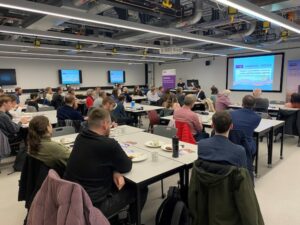Local policymakers attend seminar on transport austerity at The University of Manchester
 Half of all households in the UK do not have regular access to a car. This number jumps to 60% for the most deprived groups in society. 57% of working age people live in areas where jobs are more than 45 minutes away by public transport. Meanwhile, cuts to public services (including transport) disproportionately affect the most disadvantaged groups in society. The issue of transport austerity presents a significant, often overlooked, hurdle to tackling poverty.
Half of all households in the UK do not have regular access to a car. This number jumps to 60% for the most deprived groups in society. 57% of working age people live in areas where jobs are more than 45 minutes away by public transport. Meanwhile, cuts to public services (including transport) disproportionately affect the most disadvantaged groups in society. The issue of transport austerity presents a significant, often overlooked, hurdle to tackling poverty.
This is the argument made by Professor Karen Lucas and Professor Sarah Marie Hall at a recent policy seminar hosted by Policy@Manchester’s GM Policy Hub. The seminar, Transport and economic austerity: current and future policy agendas, took place on the University campus on 26 January. Professor Lucas and Professor Hall, professors of Human Geography, presented their research on the topic to a room of policymakers working for local authorities, the Combined Authority, Transport for the North, Transport for Greater Manchester (TfGM), and business and third sector organisations, and included a response from TfGM.
Recent moves across the city-region to make travel by bus more affordable demonstrate that transport austerity is on the Combined Authority’s agenda. However, Professor Lucas and Professor Hall highlight that more can be done to tackle transport austerity. While price caps are an important part of the solution, access in many parts of Greater Manchester remains a challenge.
The event led to a lively discussion about the many facets of transport and the economic austerity its causes, and possible remedial policies. Fundamental to the many takeaways from the seminar was that policymakers need to build a consideration of transport into to their poverty strategies and poverty into their transport policies.
- Find out more about this event and upcoming seminars on the Policy@Manchester website.
